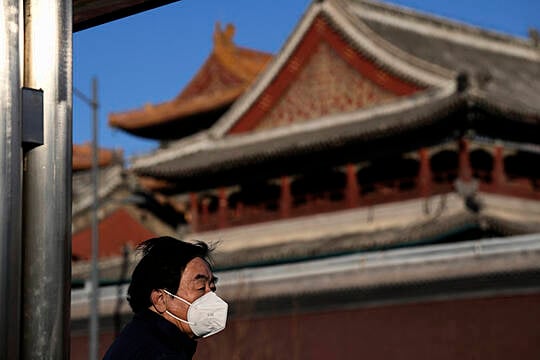Foreign companies have welcomed China’s decision to end quarantine for travellers from abroad as an important step to reviving slumping business activity.
The ruling Communist Party’s abrupt decision to lift some of the world’s strictest anti-virus controls comes as it tries to reverse an economic downturn.
It has ended curbs that confined millions of people to their homes and sparked protests, but hospitals have been flooded with unwell patients as the virus spreads.

The announcement late on Monday that quarantine for travellers from abroad would end on January 8 is the biggest step towards ending limits that have kept most foreign visitors out of China since early 2020. Quarantines were reduced last month from seven days to five.
Also on Monday, the government downgraded the official seriousness of Covid-19 and dropped a requirement for people with the virus to be quarantined.
Controls had been expected to stay in place at least through to mid-2023.
“It finally feels like China has turned the corner,” the chairman of the American Chamber of Commerce in China, Colm Rafferty, said in a statement.

He said ending the quarantine “clears the way for resumption of normal business travel”.
Business groups have warned that companies were shifting investment away from China because foreign executives were blocked from visiting.
The American chamber said that more than 70% of companies who responded to a poll this month expected the impact of the latest wave of outbreaks to last no more than three months, ending in early 2023.
The British Chambers of Commerce expressed hope that China would restart normal processing of business visas to allow “resumption of crucial people to people exchanges”.
It said it would “contribute to restoring optimism and reinstating China as a priority investment destination”.

The move “will potentially boost business confidence,” but companies were likely to “wait to see how the situation on the ground evolves” before making long-term decisions, the European Union Chamber of Commerce in China said in a statement.
Meanwhile, Japan announced that visitors from China would undergo virus tests starting on Friday as a “temporary emergency measure”.
Visitors who tested positive would be quarantined for one week, Prime Minister Fumio Kishida announced.
He said Japan would also reduce a planned increase in the number of flights between Japan and China “just to be safe”.
This followed India’s decision last week to begin requiring a negative virus test for travellers from China, Japan, Hong Kong, South Korea and Thailand.
India also randomly tests 2% of airline passengers arriving from abroad. Visitors who test positive or have symptoms are quarantined.
A foreign ministry spokesman defended China’s handling of the latest outbreaks.
“The Chinese government has always followed the principle of science-based and targeted measures,” Wang Wenbin said.
He called for a “science-based response and co-ordinated approach” to keep travel safe and “promote a steady and sound recovery of the world economy”.
China kept its infection rate low with a “zero Covid” strategy that aimed to stamp out virus transmission by isolating every case. This prompted complaints that controls were too extreme and counterproductive.

Starting last month, the ruling party has gradually joined the UK and US and other governments that are trying to live with the virus by treating infections instead of imposing blanket quarantines on cities or neighbourhoods.
The ruling party announced changes on November 11 that it said were aimed at reducing disruptions after economic activity had lessened. More changes were announced following protests that erupted on November 25 in Shanghai and other cities.
The government has stopped reporting nationwide case numbers but announcements by some cities indicate that at least tens and possibly hundreds of millions of people might have been infected since the surge began in early October.
The outbreaks have prompted complaints that Beijing relaxed controls too abruptly but officials say the wave began before the changes.







